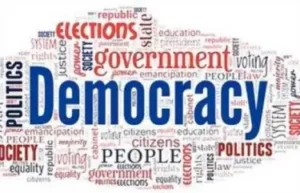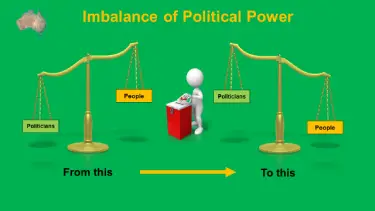Description: Empowered Democracy

Discover how empowered democracy, recall elections, citizens’ veto, and digital feedback lead to empowering the people and put power in people’s hands.
In the heart of a small community in Australia, a group of citizens rallied to prevent the closure of their local park – a testament to what can happen when people take democracy into their own hands. This story exemplifies the core of democracy: power to the people, not just on election day, but every day.
As we navigate the complexities of modern governance, the call for more direct forms of democratic engagement grows louder. This guide delves into how recall elections, citizens’ veto, and formal electronic advice to representatives can revitalize our democratic practices, ensuring that the people’s voice still is at the forefront of political decision-making.
Who Will Find This Article Useful?
This article is crafted for those deeply invested in the political landscape, advocates for reform, and anyone looking to deepen their engagement with the democratic process. Our goal is to illuminate paths toward greater governmental accountability and citizen involvement, empowering readers with knowledge and tools to drive meaningful change.
Empowering Democracy Through Innovative Strategies
This section serves as an introduction to the fundamental concepts of an empowered democracy that is directly influenced by citizen participation. It explains how an empowered democracy is not just limited to voting in elections but also involves active civic engagement through mechanisms that allow citizens to exert direct influence on political decisions.
The narrative sets the stage for deeper exploration into specific democratic tools like recall elections and citizens’ vetos, which empower voters beyond conventional electoral processes.
Recall Elections: Empowering Voters to Hold Officials Accountable
Recall elections are a direct democratic tool that allows citizens to remove elected officials from office before their term ends. This subsection will explore the legal framework, historical examples, and the strategic implications of recall elections.
It will discuss how this mechanism can be used effectively to hold public officials accountable, ensuring they align with the needs and wishes of their constituents. By understanding the intricacies of organizing a recall election, readers will gain practical knowledge on mobilizing for change where needed.
Citizens’ Veto: A Voice in Legislation
The citizens’ veto, also known as a referendum or popular veto, is a form of direct democracy that allows voters to challenge laws passed by their government. This subsection will delve into how the veto process works, its significance in the legislative process, and latest trends where citizens have successfully used this power to overturn decisions that did not reflect public opinion. Analysis will include case studies that highlight both successes and challenges faced by communities employing this powerful tool.
Electronic Advice to Representatives: Bridging the Gap with Technology
As digital platforms become increasingly integral to our daily lives, their role in democracy has grown significantly. This part of the article focuses on how technologies like electronic polling, digital forums, and feedback apps can bridge the gap between citizens and their representatives.
It will cover the advantages of these technologies in creating a more responsive and engaged civic environment, while also addressing potential pitfalls such as data security and digital divide issues that could hinder participation.
Harnessing People-Power: Practical Steps to Utilize Democratic Tools
To effectively employ specific democratic tools such as recall elections, citizens’ veto, and digital platforms, understanding the operational aspects and strategic implementation is crucial. This section provides clear, actionable steps for individuals and communities looking to actively participate and influence their governance systems.
Recall Elections: Mobilizing for Change
Understanding the Requirements:
Each jurisdiction has specific legal requirements for initiating a recall election, typically including a petition process. First, verify the rules applicable in your area—such as the number of signatures needed (often a percentage of the total votes cast in the previous election for that office) and the time frame for collecting them.
Organizing the Effort:
1. Form a Committee: Assemble a group of committed individuals who share the goal of recalling the official in question. This group will lead the effort, manage resources, and act as the central point of communication.
2. Raise Awareness: Use public meetings, social media, and local media to inform and educate the community about the recall process and the reasons behind it.
3. Collect Signatures: Organize teams to gather signatures. Ensure that all petitioners are well-informed about the legal requirements and the importance of following them precisely.
4. Submit and Verify: Once the necessary signatures are collected, submit the petition to the designated electoral authority who will then verify the signatures.
Citizens’ Veto: Your Legislative Power
Understanding the Process:
The citizens’ veto is a referendum process that allows voters to challenge legislation passed by their government. The specifics can vary, but generally, a petition must be filed shortly after the contested law is passed.
Launching a Veto Campaign:
1. Educate the Public: Explain the implications of the law and why a veto is necessary. Clear, accessible information is key to gaining support.
2. Organize the Petition: Similar to a recall, organizing a petition drive is essential. Gather a team, designate roles, and use tools like digital platforms to streamline the process.
3. Collect and Submit Signatures: Ensure the collection of signatures is done within the legal framework. Once collected, submit them for verification.
Digital Platforms: Enhancing Engagement
Choosing the Right Technology:
Select platforms that are accessible to your target community and secure for protecting users’ data. Platforms can range from simple online forums and voting systems to more sophisticated apps that facilitate real-time feedback to representatives.
Implementing Digital Tools:
1. Promote Digital Literacy: Encourage and facilitate community members’ understanding of how to use the digital tools effectively.
2. Engage Continuously: Keep the community engaged through regular updates, feedback opportunities, and interactive sessions.
3. Monitor and Adapt: Regularly assess the effectiveness of the digital tools and be open to making changes based on community feedback.
By following these steps, communities can harness the power of democratic tools to ensure their voices are heard in the corridors of power. Engaging in these processes not only enhances democratic governance but also empowers citizens to have a direct impact on decisions affecting their lives.
Looking Ahead: The Future of Democratic Engagement
This closing section speculates on the future of democratic engagement, considering the impact of emerging technologies such as blockchain for voting and artificial intelligence in public decision-making. It aims to inspire optimism and proactive engagement from the reader, presenting a vision of a more inclusive and participatory democratic process.
This forward-looking perspective underscores the importance of adapting and embracing new tools to enhance the democratic framework, ensuring that governance truly reflects the will of the people. Of innovation in fostering a more engaged and empowered citizenry.
Enhancing Democracy with Trustworthy Practices
Using Collective Knowledge for Better Outcomes
Drawing on the collective knowledge of political science, history, and technology can offer valuable insights into strengthening democratic engagement. Engaging with articles, books, and discussions by experts in these fields can deepen our understanding of democracy’s challenges and opportunities. Forums and online communities dedicated to political science or civic technology can also be excellent resources for staying informed and connected.
Using Data to Inform Actions
Data plays a crucial role in shaping effective democratic processes. Public access to government data, such as voter turnout statistics, referendum outcomes, or feedback on public services, can empower citizens to make informed decisions and advocate for meaningful changes. Websites of electoral commissions, government transparency portals, and non-profit organizations focusing on civic engagement often provide this data. Encouraging the use of open data initiatives can foster a more informed and engaged citizenry.
Real-World Successes as Inspiration
While specific instances of successful recall elections, citizens’ vetoes, or digital platforms enhancing democracy were not detailed, knowing that such mechanisms have worked in various contexts can inspire action. Researching and sharing stories of successful democratic engagement, even at a local level, can motivate individuals and communities to explore how they might implement similar strategies in their own areas. Documentaries, news articles, and case studies on civic engagement projects can be excellent sources of inspiration.
Encouraging Active Participation
Active participation is the cornerstone of a vibrant democracy. This can take many forms, from voting in elections to taking part in local community meetings, or even starting a petition for change on issues that matter to citizens. Encouraging readers to engage with their local representatives, attend city council meetings, or contribute to online forums discussing civic issues can make a real difference in fostering a more engaged and informed public.
Calls to Action and Further Exploration
We invite you to take part in sharing democratic tools you believe would most help your community. Additionally, we encourage lively discussion in the comments section below – share your experiences, ideas, and suggestions for fostering a more vibrant and participatory democratic process.
Envisioning a Future of People-Powered Governance
As we conclude our journey through the mechanisms of empowering democracy, it’s clear that the path to a more responsive and participatory government lies in our hands. By embracing innovative tools and technologies, we can ensure that the essence of democracy – rule by the people – is not just an ideal, but a daily reality.
References:
The recall of members of parliament and citizens’ initiated elections : THE RECALL OF MEMBERS OF PARLIAMENT AND CITIZENS’ INITIATED ELECTIONS
Direct Democracy: https://www.britannica.com/topic/direct-democracy
The Politics of Recall Elections: DIGITAL DEMOCRACY: BIG TECHNOLOGY AND THE
REGULATION OF POLITICS
Constitutional choice in ancient Athens: the evolution of the frequency of decision making: Constitutional choice in ancient Athens: the evolution of the frequency of decision making
Direct Democracy: International IDEA Constitution-Building Primer: Direct Democracy
Flipped elections: can recalls improve democracy: Flipped elections: can recalls improve democracy?
Vote Wrap: For Democracy to work the voters must be involved!

